A friend recently asked me, “Should I use WordPress or Django for my new website?” It’s a great question, and a common one. Choosing the right content management system (CMS) can shape your entire online experience.
While WordPress has always been my go-to for building websites, I’ve spent time exploring Django CMS as well. I’ve helped others decide between the two, and I’ve even tested Django on a few personal projects just to see how it stacks up.
In this post, I’ll share what I’ve learned from both platforms—their surprising strengths, their limitations, and why WordPress still comes out on top for creating websites.
Whether you’re launching a blog, a business site, or something more complex, this side-by-side comparison will help you figure out which CMS fits your needs best.
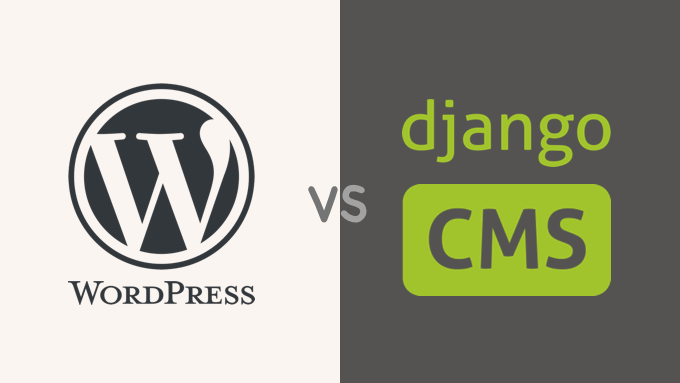
WordPress vs. Django CMS: A Brief Overview
Both WordPress and Django CMS are powerful content management systems (CMS), but they are designed for different kinds of tasks.
I’ve created a quick comparison table below to help you understand the main differences. It explains the key features of WordPress and Django CMS side-by-side:
In the sections that follow, I’ll dive deeper into each of these points and help you decide whether WordPress or Django CMS is the right choice for your project.
How I Compared WordPress vs. Django CMS
I wanted to make sure this comparison was as thorough and fair as possible, so I didn’t just rely on spec sheets and marketing brochures. So, I dug deep, using my own experience and research.
Here’s how I approached it:
Real-World Projects: I’ve built countless websites with WordPress, from simple blogs to complex eCommerce stores. I’ve seen firsthand what it can do (and what it can’t). I also set up a test environment for Django CMS so I could try everything out myself.
Hands-on Testing: I didn’t just read about the features, I actually used them. I performed common tasks like creating pages, adding images, and installing plugins. This gave me a real feel for how each platform works in practice.
Feature Comparison: I compared the core features of each platform, including ease of use, customization options, security, scalability, and content management capabilities.
Finding the Right Fit: I considered different project types and identified the ideal use cases for each platform. For example, a small business website has different needs than a large enterprise platform.
Resources and Effort: I factored in the learning curve, development time, and ongoing maintenance required for each platform. This helps you understand the true cost of ownership.
Growing with Your Project: A content management system should be able to grow with your business. I looked at how easy it is to get started with each platform and how well they handle increasing complexity as your website grows.
Why Trust WPBeginner?
We’ve been building websites with WordPress for over a decade and have seen it evolve from a simple blogging platform to the powerhouse it is today. We’ve used it to create everything from small business websites to large online stores, including this site, WPBeginner.
While we’re big fans of WordPress, we also keep a close eye on other platforms like Django CMS. We’ve even experimented with it on personal projects to understand its strengths and weaknesses firsthand.
Our goal here isn’t to sell you on one platform or the other. It’s to give you an honest, unbiased comparison based on our real-world experience. We’ll share the good, the bad, and the ugly so you can make the best decision for your specific needs.
Want to learn more about how we maintain accuracy and integrity here at WPBeginner? Check out our detailed editorial guidelines.
Since I’m going to go into a lot of detail in my comparison of WordPress vs. Django CMS, you may want to use this table of contents to quickly navigate the article:
Overview: WordPress vs. Django CMS
Choosing a content management system (CMS) is like laying the foundation for your website.
WordPress and Django CMS are both powerful tools, but they’re designed for different kinds of projects. Picking the right one from the start can save you headaches (and potentially a lot of money) down the road.
I remember when I first started building websites, I tried everything from hand-coding HTML to using clunky website builders. Then I discovered WordPress, and I immediately knew that it was what I was looking for.
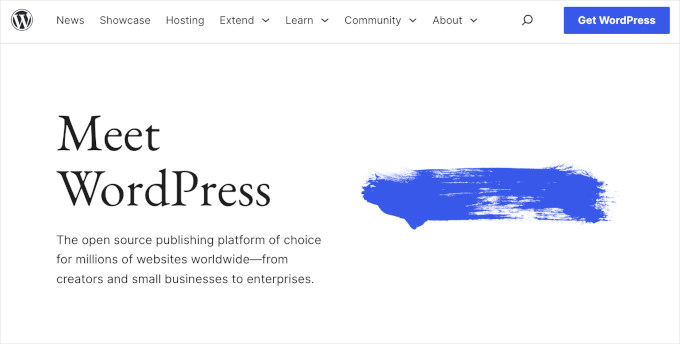

Suddenly, I could build beautiful, functional websites without needing a computer science degree. I’ve used it for everything from simple blogs to complex eCommerce sites.
So, what is WordPress, anyway? It’s the most popular website builder and CMS on the planet, powering over 43% of the web. It’s free, open-source, and incredibly versatile. Plus, there’s a massive community of users and developers ready to help you out.
Getting started is a breeze, especially with one-click installs offered by hosts like Bluehost and Hostinger (I’ve used both, and they make it super easy).
As my projects got more complex, I started hearing about Django CMS. It’s a favorite among developers who want more flexibility and control. I even tried using it for a personal project, and it was a completely different experience.
Think of it as building a house from scratch. With Django, you have complete control over every detail, but it requires a lot more technical know-how.
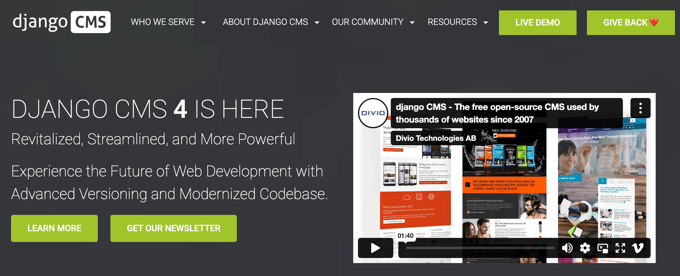

Django CMS is built with Django, a powerful framework that uses the Python programming language.
It is a set of tools and libraries that provide a foundation for building web applications. It’s also free and open-source, but it’s definitely geared towards developers.
You’ll need to be comfortable with coding and server administration to get the most out of it. It’s ideal for large, complex projects that demand a high level of customization and scalability.
Now that you have a basic understanding of both platforms, let’s dive deeper into the key differences between WordPress and Django CMS.
Ease of Use: Which CMS is Easier to Learn?
Ease of use is a big concern for many website builders. You’re probably looking for a platform that’s simple to navigate without prior technical expertise.
Let’s see how WordPress and Django CMS compare in terms of user-friendliness.
WordPress: Easy to Use Most of the Time
WordPress is known for its user-friendly nature. Setting up a basic blog in WordPress can be done in a matter of hours.
The block editor is intuitive, like building with digital Lego bricks. You can easily drag and drop different content blocks to create pages without coding.
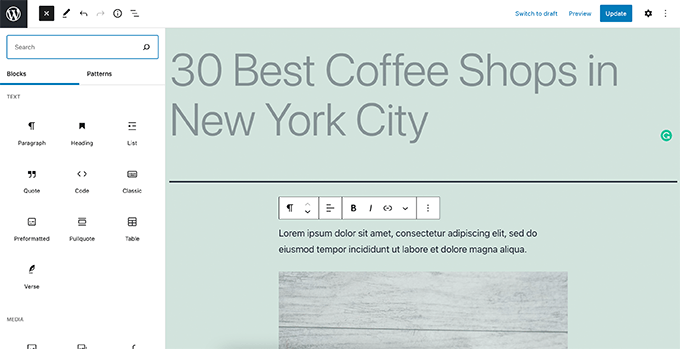

And getting started is super easy. Most web hosts, like Bluehost (my personal favorite), offer one-click WordPress installs.
That means you can literally have a website up and running in minutes. WPBeginner readers get a special discount, so you can get started for just $1.99 per month.
After WordPress is installed, you’ll be able to access the admin dashboard. From here, you can customize your site’s design, add new pages, and manage your content. It’s very straightforward.
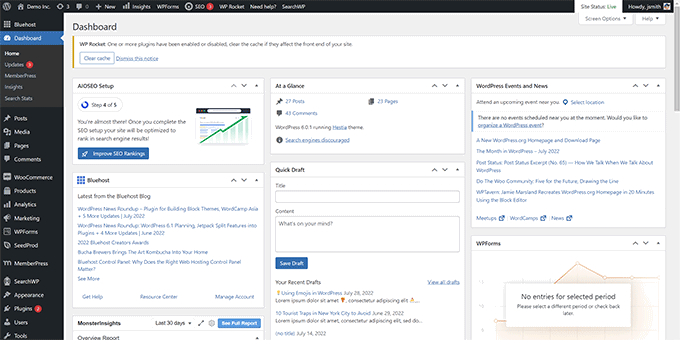

For details, see our guide on how to create a WordPress website.
Django CMS: For Developers and Code-Savvy Users
Django is built for developers who love the flexibility and control of coding. But if you’re a beginner or prefer a no-code approach, it will feel overwhelming.
You’ll need to know how to code in Python and be familiar with web development concepts to use Django CMS effectively. I’ve talked to friends who tried to use Django CMS without coding experience, and it often leads to frustration.
Even simple tasks, like changing your website’s theme or adding a contact form, often require coding or working with Django’s templating system.
Django CMS’s content editor is relatively straightforward, similar to WordPress’s older classic editor.
It lets you work with formatted text, but not create complex layouts like the newer WordPress block editor.
But most customization happens behind the scenes in code. This can be a steep learning curve for non-developers.
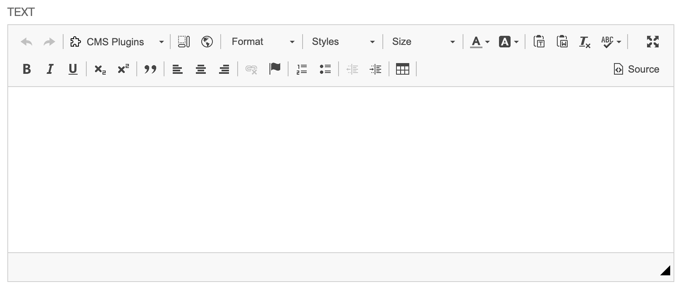

Here’s a quick overview of what makes Django CMS less user-friendly for non-developers:
Installation and setup require technical knowledge of server administration and command-line tools, such as SSH and virtual environments.
Theme customization involves editing HTML, CSS, and Django templates, which requires familiarity with Django’s templating language.
Plugin management often requires installing and configuring Python packages.
While the content editor is simple, managing content structures and advanced features often requires coding.
All that said, if you have a strong technical background, all of this may sound ideal.
🏅 Winner for Ease of Use – WordPress
For non-programmers, WordPress is the clear winner. It’s intuitive, user-friendly, and packed with features that make building a website a breeze.
Django CMS, while powerful, is best left to the developers. If you’re looking for a quick and easy way to get online, WordPress is your best bet.
Customization Options: Making Your Website Your Own
Customization options are essential for creating a unique and functional website. So, how do WordPress and Django CMS compare in terms of customization?
WordPress: Customization Made Easy
WordPress is famous for its flexibility. I’ve built countless websites using the CMS, and I’m always amazed by how much you can change without writing a single line of code. The secret is the large selection of themes and plugins.
Themes transform your website’s appearance with just a few clicks. Thousands of free and premium themes mean you’re bound to find something that perfectly matches your style.
Looking for recommendations? Here are some of my favorite themes.
If you want more customization options, most themes offer built-in options to change colors, fonts, and layouts effortlessly.
For advanced options, the theme customizer or adding custom CSS opens up a world of possibilities.
Then there are plugins, which are like apps for your website. They add all sorts of functionality, from contact forms and online stores to SEO tools and security enhancements.
With over 59,000 free plugins in the WordPress plugin directory and countless premium plugins, the possibilities are nearly endless. Just see my pick of the best WordPress plugins for all websites to get an idea of what they can do.
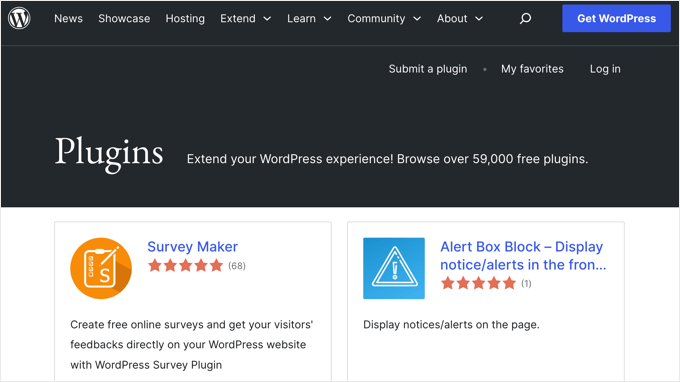

Django CMS: Customization for Coders
Django CMS takes a different approach to customization. Instead of using visual interfaces and drag-and-drop builders, you customize your website using code.
If you’re a Python developer, this may sound perfect. You can build virtually anything you can imagine to your exact specifications. While it requires more development time upfront, the level of customization you gain can only be achieved using code.
Features like custom product displays, complex filtering options, and unique checkout processes are all possible thanks to Django’s code-centric approach.
Here’s a glimpse into Django CMS’s customization options:
Pre-built themes can be used as starting points for custom development. But most Django CMS projects involve building a custom theme from scratch.
Django apps extend functionality like WordPress plugins. However, installing and configuring them requires some coding knowledge, and the selection is not as extensive as the WordPress Plugin Directory.
Django’s templating system provides control over your website’s HTML structure and content presentation.
Django CMS integrates with other systems through APIs, allowing you to connect your website with CRM software, marketing automation tools, and more.
If you’re not a developer, you’ll need to hire one to customize your Django CMS website. While this adds to the cost, it also gives you more control over customization.
🏅 Winner for Customization Options – WordPress
If you want easy, no-code customization, WordPress is the clear winner. Its huge library of themes and plugins makes it simple to create a unique website without touching any code.
Django CMS offers ultimate flexibility for developers, but it comes at the cost of increased complexity.
Content Management: Keeping Your Content Organized
Effective content management is essential for websites with frequent updates. You need a CMS that makes it easy to create, organize, and manage all that content.
So, how do WordPress and Django CMS compare in this department?
WordPress: Content Management Powerhouse
WordPress began its journey as a blogging tool, and content management remains one of its greatest strengths. From personal blogs to extensive content hubs, WordPress excels thanks to its flexibility and user-friendliness.
Writing and editing content in WordPress is a breeze. The block editor is incredibly straightforward, allowing you to add text, images, and videos with simple drag-and-drop actions.
You can group your posts together in different ways using categories and tags. You can think of categories as the main sections of my website, and tags as a detailed index.
WordPress also has a built-in media library that makes managing images and videos super easy. You can upload, organize, and insert media into your content with just a few clicks.
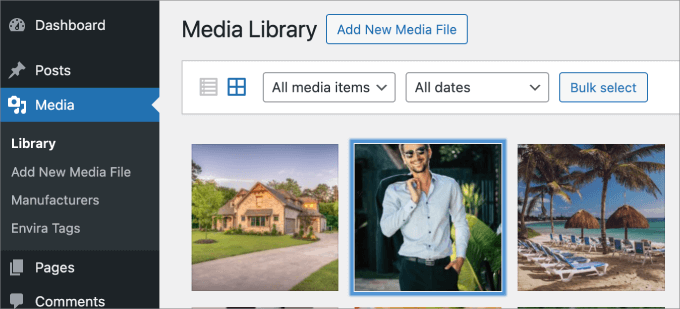

And if you’re working with a team, WordPress’s user role management is extremely helpful. You can assign different roles (administrator, editor, author, and more) with specific permissions.
This makes sure that everyone has the access they need without risking accidental deletions or unwanted changes.
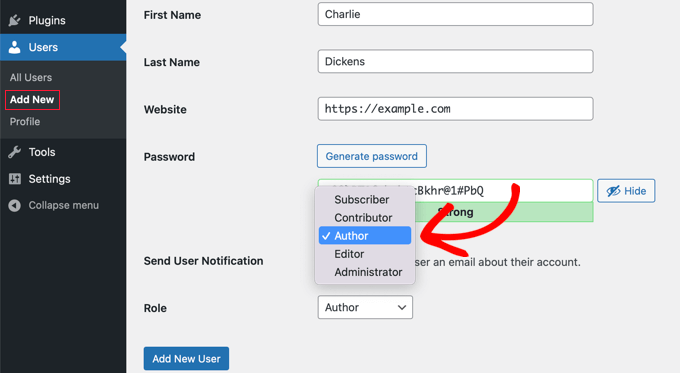

Need even more content management features? No problem! WordPress has thousands of plugins that can add everything from custom content types to advanced SEO tools.
Django CMS: Content Management for Developers
Django CMS offers a basic interface for creating and editing content. But it lacks the intuitive user-friendliness of WordPress. I’ve found that even simple tasks, such as creating pages or managing menus, can sometimes require technical knowledge.
And while Django CMS does offer user roles and permissions, configuring them is often more complex than in WordPress. Customizing roles or creating new ones typically involves coding or working with Django’s admin interface, which can be a hurdle for non-developers.
For instance, imagine you need to create custom user roles with specific permissions. In WordPress, this would be straightforward. Meanwhile, in Django CMS, it requires writing custom code.
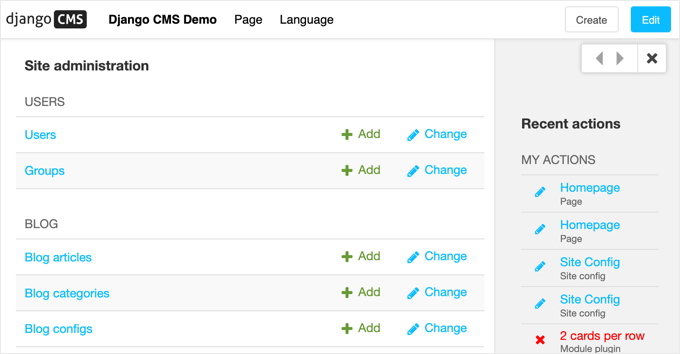

Here’s a closer look at Django CMS’s content management features:
You can create and organize pages within a hierarchical structure. However, customizing page templates and adding advanced features often requires coding.
Adding a navigation menu is easy, but complex menu structures or dynamic menus might require custom development.
Managing user access and capabilities is possible, but customization often involves code.
You can track content changes and revert to previous versions of your content.
Django CMS offers multilingual capabilities, but configuring multiple languages can be complex.
While Django CMS offers powerful content management tools, its developer-centric approach can be challenging for non-technical users.
🏅 Winner for Content Management – WordPress
For most users, especially those without a technical background, WordPress is the clear winner for content management. It offers a user-friendly interface, powerful features, and a huge ecosystem of plugins for content creation, organization, and management.
Django CMS is more flexible for developers, but it comes at the cost of increased complexity.
eCommerce: Selling Online
Selling online requires a comprehensive eCommerce platform. Let’s compare WordPress and Django’s online store capabilities.
WordPress: Great for Selling Online
WordPress doesn’t have eCommerce features out of the box. But you can quickly set up an online store with the help of plugins like WooCommerce. I’ve used WooCommerce a lot for my own projects, and I found it to be very powerful and easy to use.
After installing WooCommerce, it guides you through the setup. Then, you can add products, set up payment methods (like Stripe or PayPal), and decide how to ship things right from the familiar WordPress dashboard.
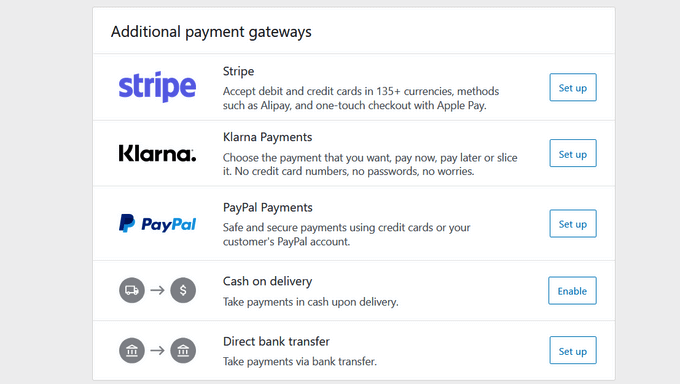

You can easily customize WooCommerce using plugins and themes designed specifically for online stores. There are plugins available for detailed shipping costs, managing subscriptions, and even adjusting prices according to specific rules.
If you need a simpler way to sell online, especially for digital items or services, I would also suggest looking at Easy Digital Downloads (EDD).
For more information, just see our guide on how to start an online store.
Django: Building a Custom Online Store
Django also doesn’t have eCommerce features built in. However, its power and flexibility let you build the exact online store you want, piece by piece.
This approach gives you total control over everything in your store. You control how data is stored, how the site operates behind the scenes, what users see, and how it integrates with other services. It’s great for making unique online stores with custom features.
While you can build an eCommerce site completely from scratch using Django, there are several tools and frameworks that can help you build faster:
Oscar Commerce is a set of open-source tools for making eCommerce sites with Django. It provides a foundation for features such as product lists, shopping carts, checkout pages, and order management.
Saleor started as a Django program but has grown into a powerful, headless eCommerce platform. It can build modern online stores with separate front ends and backends.
There are also simpler tools and libraries if you only need certain eCommerce features.
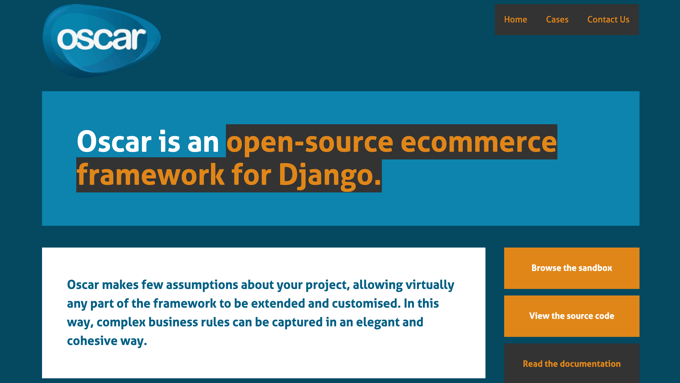

Building a custom store with Django requires coding knowledge. It’s a good fit for businesses with complex needs, but it’s not a suitable choice for beginners.
🏅 Winner for eCommerce – WordPress
In most cases, WordPress wins in the eCommerce category.
That’s because you can easily turn WordPress into an eCommerce platform by installing an eCommerce plugin like WooCommerce or Easy Digital Downloads. You can quickly get started selling online at an affordable price, and the large WordPress community means it’s easy to find help and information.
Django may be better for building custom online stores where you need full control over every small detail and have a large budget. For example, your developers could build a system with complex billing rules and smart ways to suggest products for specific customers.
That said, you can still get advanced eCommerce functionality with WordPress as long as you have the right tools. For instance, you can add wholesale features using Wholesale Suite or create custom eCommerce automations with Uncanny Automator.
Performance: Speed Matters
Website performance is crucial for user experience, search engine rankings, and your bottom line. So, let’s see how WordPress and Django CMS compare.
WordPress: Performance Requires Optimization
WordPress is incredibly popular, and out of the box, it’s generally fast enough for most small websites. But as your site grows, with more content, plugins, and fancy features, things can start to slow down.
I’ve seen this happen with friends’ websites. One of the biggest causes of this is poorly coded themes and plugins. That’s why it’s important to select the perfect WordPress theme and the right WordPress plugin.
And speaking of tools, a caching plugin is essential for any WordPress site. Caching works by taking a ‘snapshot’ of your web pages and storing them temporarily, instead of generating them from scratch every time a visitor arrives.
This significantly reduces server load and speeds up your site. I personally recommend WP Rocket for its user-friendly interface and powerful optimization features.
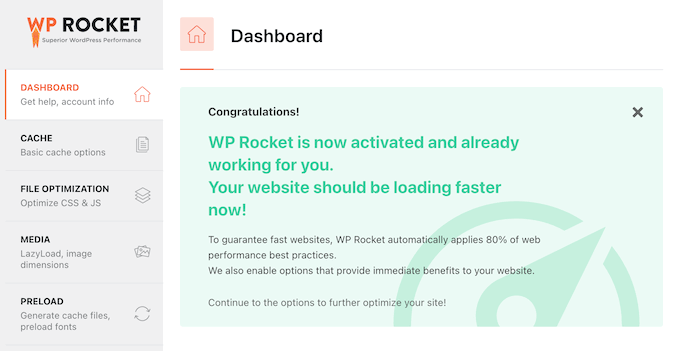

We used it for a long time here at WPBeginner and had a great experience with it. You can see our full WP Rocket review for more information.
Overall, WordPress can be incredibly fast with proper optimization. We’ve even put together a comprehensive guide to help you boost your WordPress site’s speed and performance.
Django CMS: Built for Speed
Django CMS is built on the high-performance Django framework, which is designed for speed and efficiency from the ground up.
Because features and customizations are built with code, there’s less reliance on plugins or extensions that could add bloat and slow down a website.
Django’s efficient architecture and the streamlined, custom-coded nature of the site can result in better performance, lower page load times, and the ability to handle higher traffic volumes.
But it’s important to remember that even with Django CMS, poorly written code can negatively impact performance. If you’re not an experienced Django developer, you should hire one to make sure your site is optimized for speed and efficiency.
Beyond just being fast, Django is also incredibly scalable. This means a Django CMS site can easily grow with your business, handling a large increase in traffic, content, and features without a significant drop in performance.
🏅 Winner for Performance – Django CMS
Out of the box, Django CMS generally outperforms WordPress in terms of speed and efficiency (as long as you’re using efficient coding practices). However, with proper optimization, WordPress can also achieve excellent performance.
If you’re willing to put in the effort (or hire someone who is), then WordPress can handle even high-traffic events. But if speed is your top priority and you have the technical expertise, Django CMS might be a better choice.
Security: Keeping Your Website Safe
Security breaches can devastate a website. They can result in lost data, frustrated users, and a damaged reputation.
So, let’s talk about how WordPress and Django CMS compare when it comes to keeping your site safe.
WordPress Security: Staying Ahead of the Threats
With the right precautions, WordPress can be incredibly secure. I’ve used it for years on countless sites, and I’ve learned a few tricks along the way.
First of all, it’s best to keep everything updated. The WordPress core software is regularly patched for security vulnerabilities, so those updates are your first line of defense.
I always recommend setting up automatic updates whenever possible because it’s one less thing to worry about.
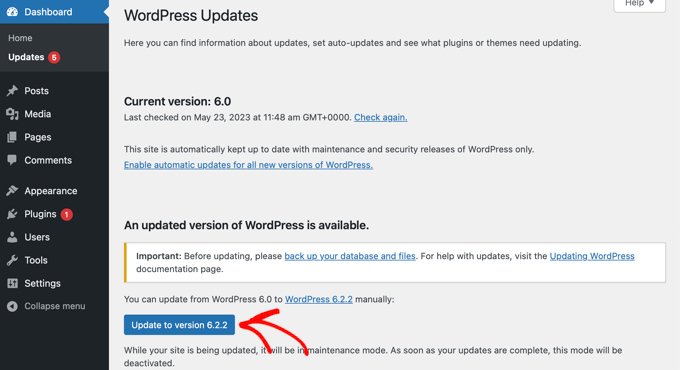

Next, you’ll want to be picky about your themes and plugins. Just like I wouldn’t install software from a suspicious website on my computer, I’m careful about what I add to my WordPress sites.
It’s best to stick to reputable sources like the official WordPress directory and well-known developers. And remember, you’ll need to keep those plugins and themes updated, too. Updates often fix security vulnerabilities that could be used to hack your website.
On top of following these best practices, I also recommend using a security plugin. This tool will typically offer malware scanning, firewall protection, and more.
For more on keeping your WordPress website safe, see our ultimate WordPress security guide.
Django CMS Security: A Solid Foundation
Django CMS uses the Django framework’s strong security foundation right out of the box. This is a major advantage for developers who want to prioritize security from the ground up.
For instance, when users submit content on a Django site, the system automatically cleans it up. This prevents a common type of attack called XSS (Cross-Site Scripting), where malicious code tries to sneak onto your site through user input.
Also, for every form you fill out on a Django site, there’s a unique, invisible security token attached to it. This makes it much tougher for attackers to hijack your session or trick you into doing something unintended.


That said, Django requires a lot of the same security best practices as WordPress (or any other CMS), such as regular updates, strong passwords, and two-factor authentication.
Secure coding practices and proper configuration are also important, especially when dealing with sensitive data.
If you’re not a developer, you’ll need to hire a Django expert to make sure your site is configured securely, and you may need them to run regular security audits.
🏅 Winner for Security – Django CMS
Django CMS is more secure out of the box, thanks to the framework’s built-in protections. However, with proper precautions, like regular updates, careful plugin selection, and a solid security plugin, WordPress can also be very secure.
Ultimately, the security of any website depends on your diligence and the steps you take to protect it, regardless of the platform you choose.
Community and Support
A supportive community and readily available resources are essential when building a website. Let’s see how WordPress and Django CMS compare for community and support.
WordPress: A Global Community at Your Fingertips
WordPress is the most popular website builder and has a huge, global community of users, developers, and designers.
Whether you’re stuck on a coding problem, need help choosing a plugin, or just want some general advice, there’s always someone willing to help. And there are plenty of helpful WordPress resources, including Get Started documents, courses, workshops, and lessons.
You’ll find answers to almost any question you can imagine. You can learn more on the official Learn WordPress and Make WordPress pages.
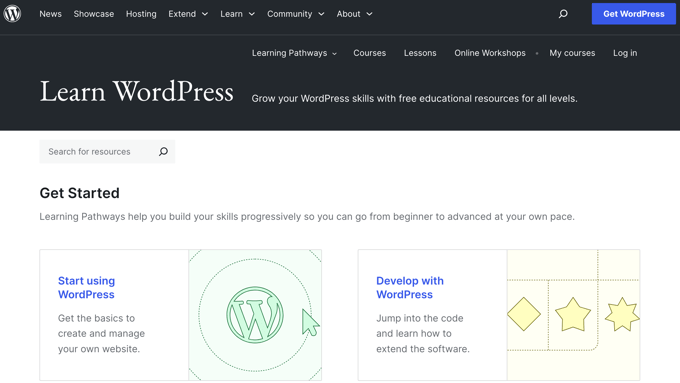

And here at WPBeginner, we offer many different tutorials like this one, a newsletter, free video tutorials, the WPBeginner Engage Facebook Group, a YouTube channel, and more.
Learn how to make the most out of WPBeginner’s free resources in this guide.
Django CMS: A Smaller, More Focused Community
Django CMS has a smaller, more niche community compared to WordPress. This smaller community means you’re interacting with a highly skilled and dedicated group of individuals who are willing to share their expertise.
However, the smaller community does mean fewer readily available resources. You’ll find less documentation, fewer online tutorials, and a smaller selection of pre-built themes and plugins.
This can make it more challenging to find solutions to common problems. You might have to rely more on your own problem-solving skills or reach out directly to the community for assistance.
The Django CMS community is active on platforms like Stack Overflow and specialized forums. While it might take a bit more effort to find answers, the quality of support is often very high. You’re more likely to get in-depth technical assistance from experienced developers.
Here are some key differences in community support:
While Django CMS has official documentation, it’s often more technical and assumes a higher level of coding knowledge compared to WordPress’s user-friendly documentation.
The Django CMS community is active on various platforms, but the overall size and activity level are significantly lower than WordPress’s massive online presence.
A smaller selection of readily available themes and plugins means you’ll likely need to invest more time in custom development or searching for suitable third-party solutions.
If you’re comfortable with independent learning and problem-solving, the smaller Django CMS community might not be a major drawback. However, it doesn’t compare to WordPress’s large and active community, which offers readily available resources.
🏅 Winner for Community and Support – WordPress
For most users, WordPress offers better support due to its large, active community and readily available resources.
However, developers will appreciate Django’s smaller, more focused community, although it requires more independent problem-solving.
Cost: Which CMS Is More Affordable?
WordPress and Django differ significantly in their overall cost. I’ll give you some real-world examples so you can get a better idea of what to expect.
WordPress: Budgeting for Your Site
WordPress itself is free, but you’ll need web hosting and a domain name (around $10-20 per year). Web hosting is where your website is stored, and a domain name is your site’s address.
Hosting costs can range from a few dollars a month for basic shared hosting (perfect for beginners) to hundreds or even thousands for high-performance managed hosting (ideal for larger sites with lots of traffic).
Let me give you a few examples of what to expect:
💵 Basic Blog: $50-150 per year (hosting, domain, a simple theme)
💸 Small Business Website: $100-500 per year (hosting, domain, a slightly more advanced theme, a few premium plugins)
💰 eCommerce Store: $ 500-2,000+ per year (hosting, domain, a premium WooCommerce theme, several specialized plugins, potentially some custom development)
I’ve used both shared and managed hosting, and the best choice really depends on your specific needs.
For example, when WPBeginner was launched, we first used shared hosting to keep costs low. As the site grew, we switched to managed hosting for better performance and security.
While there are many excellent free themes and plugins available, premium options can significantly enhance your site’s functionality and design.
I often recommend premium plugins for features like advanced SEO or eCommerce functionality. These can be one-time purchases or ongoing subscriptions. Either way, you’ll need to factor those into your budget.
Finally, if you need custom development work, you might need to hire a developer or designer. This can add to the overall cost, but it’s often worth the investment for a truly unique and functional website.
For more details, see our guide on how much it really costs to build a WordPress website.
Django CMS: Factoring in Development Costs
Like WordPress, Django CMS is free. But because it’s more developer-focused, the overall cost is usually higher.
You’ll still need hosting and a domain name, but you’ll likely need more powerful (and more expensive) hosting options like VPS or cloud hosting to handle Django’s requirements.
I’ve found that this can be a significant difference in ongoing expenses compared to basic WordPress hosting. Expect to pay $50-200+ per month for suitable hosting.
The most significant cost difference, however, typically comes from development. Django CMS almost always requires a developer for setup, customization, theme creation, and maintenance.
I’ve seen projects range from a few thousand dollars for a basic setup to tens of thousands for complex, custom-built applications. While you’ll save on premium themes and plugins (Django customization is done through code), developer fees are a substantial part of your budget.
For example, a simple Django CMS website could cost $3,000-$8,000 in initial development costs, while a complex web application could easily exceed $20,000.
🏅 Winner for Affordability: WordPress (Usually)
WordPress is more affordable for most users, especially those starting with a smaller budget. I’ve helped a lot of different people launch websites on a tight budget using WordPress. The lower hosting costs and free themes and plugins make it a great choice for getting started.
However, for some complex custom projects, Django might be a better long-term investment, despite the higher upfront development costs.
The Verdict: Choosing the Right CMS for Your Needs
For most users, especially those who prefer not to work with code, WordPress is the clear winner. Launching websites with WordPress is easy, even for people with limited technical skills. It’s quick to set up, easy to use, and incredibly versatile thanks to the massive library of themes and plugins.
If you want a user-friendly way to create and manage content, WordPress is hard to beat. It’s like having a trusty toolbox filled with all the tools you need to build just about anything.
However, if you’re tackling a complex project that demands serious customization, high scalability, and robust security right out of the box, then Django CMS might be a better choice.
To help you make the right decision, here’s a table summarizing the typical users and primary use cases each platform is designed for:
I always recommend carefully considering your priorities, technical skills, and budget before making a decision.
Expert Tip: Want a beautiful WordPress website without all the hassle? Our team offers affordable WordPress Website Design Services, including:
A dedicated project manager
Multiple revisions
Design services for blogs, eCommerce stores, and more
Prices start at just $799 for a new website. Check out our Design Services page for more information!
FAQs About WordPress vs. Django CMS
Now that you have read our comparison of WordPress vs. Django CMS, you may still have some questions. Here are some brief answers to frequently asked questions.
Is WordPress or Django easier for beginners?
WordPress is much easier to use for beginners and users without coding experience. It has a user-friendly interface, one-click installation, and a large library of themes and plugins. This makes it quick to set up and manage content.
Is Django CMS good?
Yes, Django CMS is considered a good content management system. It’s a strong choice for complex projects where a standard, off-the-shelf content management system (CMS) might be too limiting. However, most users will find WordPress a better choice for their blog or website.
Which is better for content, WordPress or Django CMS?
I prefer WordPress for content-focused websites. Its core design and editor are built for usability, and extending content types is simple using themes and plugins.
Django CMS provides an editing interface, but setup and customization require coding expertise.
Do I need coding skills to use WordPress or Django?
You can build functional websites with WordPress without coding skills, thanks to its user-friendly dashboard and extensive plugin ecosystem. However, you can choose to hire a developer if you need extensive customization.
Django, on the other hand, fundamentally requires coding skills for development, setup, and customization.
Is WordPress or Django more customizable?
WordPress provides extensive customization for non-developers through themes for appearance changes and plugins for adding features. Django offers customization at the code level due to its nature as a framework.
Which platform is more secure, WordPress or Django?
Django CMS is often considered to have a stronger built-in security foundation. However, if you keep its core, themes, and plugins up to date, then WordPress can also be very secure, especially when you use a reputable security plugin.
Is WordPress faster than Django?
Django CMS is designed for speed and has a performance advantage, particularly for complex and high-traffic websites. However, if you spend time optimizing WordPress, its performance can also be excellent.
Which is more affordable, WordPress or Django?
WordPress can be a more affordable option for getting started, especially for basic websites. There are many free themes and plugins, and basic hosting can be inexpensive. However, costs for premium themes, plugins, and development help can add up.
Django projects typically require developer involvement from the start, which can lead to higher upfront costs. But for complex projects, this can be a worthwhile investment for long-term scalability and maintainability.
Are there a lot of resources for Django?
WordPress has a much larger community and more resources, including documentation, tutorials, and available developers.
Django CMS has a smaller but active and developer-focused community. There are resources, but nowhere near as many as for WordPress.
When should I choose WordPress vs. Django CMS?
I recommend choosing WordPress if you need a user-friendly CMS for blogs, small business websites, or content-focused sites where ease of use is important.
You may want to opt for Django CMS if you are building complex websites, web applications with content management needs, or projects requiring high levels of customization, scalability, and security.
Bonus Resources: Website Building & Content Management
I hope this tutorial helped you compare WordPress vs. Django and their pros and cons.
You may also want to see some other helpful resources we have at WPBeginner:
If you liked this article, then please subscribe to our YouTube Channel for WordPress video tutorials. You can also find us on Twitter and Facebook.


